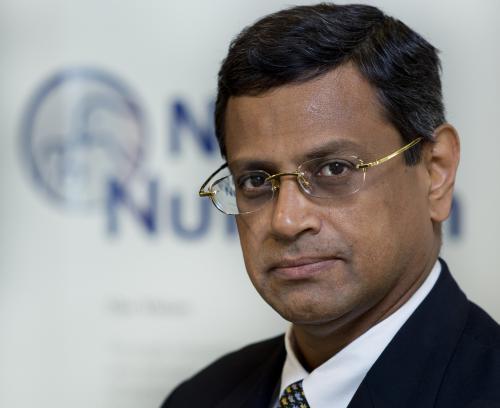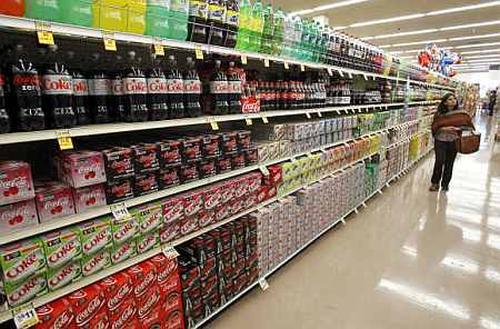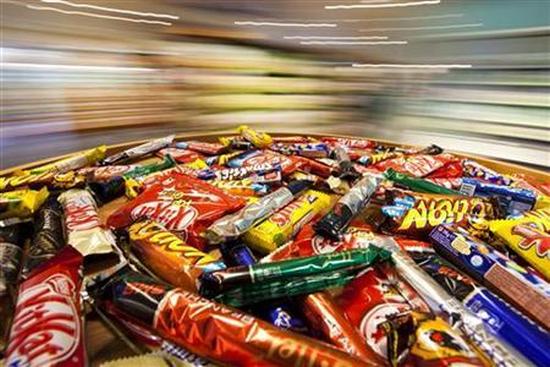Photographs: Kind Courtesy, Nestle Dilasha Seth in New Delhi
As Nestle opens its global R&D centre in Manesar, it plans to also come up with new products in various categories. India, which contributes just less than 2 per cent of its overall business, will see an increased focus in the premium category products by the Switzerland-based company. Nandu NandKishore, executive vice-president Nestle S.A., zone director for Asia, Oceania, Africa and West Asia tells Dilasha Seth that in the semi-urban to rural category it is more of a price-point challenge, whereas in the affluent category, it is more of an innovation challenge. Edited excerpts.
You have said that emerging markets contribute about 40 per cent of Nestle's business and you are targeting 50 per cent contribution from these emerging markets by the end of the decade. However, India's contribution is less than 2 per cent of your overall business. What are your expectations or outlook on the Indian market for you?
Yes, India contributes less than 2 per cent to our overall business. Fundamentally emerging markets have to be the growth engines of the global economy and also of our business.
Slowing growth depresses a little bit of all books but then we have to think of innovation and we have to work harder to create growth momentum, which India has created in the last three years for us. We have had 20 per cent plus growth in the past 26 quarters in India and that's marvellous.
We see growth happening in Europe and despite the crisis; we have seen growth for us in Greece.
...
Challenges Nestle faces in India
Image: Nestle cereal boxes are pictured through a logo in the company supermarket at the Nestle headquarters in Vevey, SwitzerlandPhotographs: Valentin Flauraud/Reuters
How much do you plan to invest in India in the next 1 year or so?
We have invested $500 million in the last three years to create the capacities, be it chocolates, noodles, coffees, so we need to use those capacities and use targeted innovation to create growth that GDP tide may not be able to provide.
We have ongoing investment planning process. Let's digest the big chunk of investment we have had in the past and then go for another big chunk of expansion.
What is your specific plan for India in terms of product categories?
Cities are the engines of economic growth. Fundamentally two big markets are opening up - for affluent and for semi-urban.
Premium goods and services, primarily linked to growth of cities such as five-star hotels, Starbucks, etc. Then there is semi-urban or rural. Our innovations have to cater to both,
How do you assess your performance in these two segments in the country?
Historically, we have been good with the semi-urban and rural category targeting, with the price points like Rs 2 or Rs 5 and Rs 10 pack. You get Maggi noodles in a Rs 5 pack.
...
Challenges Nestle faces in India
Photographs: Reuters
Is there a category where Nestle needs to buck up in India?
We haven't done well in the emerging affluent section. We have products in the premium category in infant space, dark chocolates, and so on, for the bottom billion it is a price point challenge more than the innovation challenge.
Innovation challenge is more at the top. How do you bring innovative products at the top of the pyramid, where there's a huge demand, is what we have not fulfilled yet.
What products are you planning to launch in India in the premium category?
You will see coffee, chocolates, premium noodles and other premium offerings coming in. We have Nescafe dolce gusto, which is a coffee machine system in Europe for the last five years, which is highly successful. It allows you to have a coffee shop experience at home.
You want to have cafe latte macchiato; it costs you about 50 cents to do it at home, which will cost you three dollars in a coffee shop with a fancy name. It's the same quality and is consistent.
Does Nestle have plans to launch that in India?
It is something we are evaluating. We are doing some research in some large cities at this point of time and trying to identify where we should enter.
We have to learn our way into this market because historically we haven't been very good at it in India.
The way to get in is to test it in one or two cities first, make mistakes, learn. If it's a successful template then get into other cities.
...
Challenges Nestle faces in India
Image: Different types of chocolate bars are seen in the company supermarket at the Nestle headquarters in Vevey, SwitzerlandPhotographs: Valentin Flauraud/Reuters
Nestle seems to be much behind its competitor Cadbury's in India. How do you see the chocolate market going for you? Launching any new chocolates?
I was the guy who launched chocolates in 1990 in Mumbai for the first time. Before we launched, Cadbury's held 96 per cent market share. Now, we have a quarter of a market.
A market leader with a 150-year lead, and had a 96 per share, going from 0-25 per cent share is not bad. Are we happy with it? No we are not, we need to keep innovating and keep doing basics right.
About new chocolates, I have some tastings scheduled. I can't say yes or no, but that's certainly a reasonable expectation.
You are inaugurating a global R&D plant in Manesar. What is the objective?
Research in partnership with a few universities and of course coming up with new products in noodles and nutrition.






article